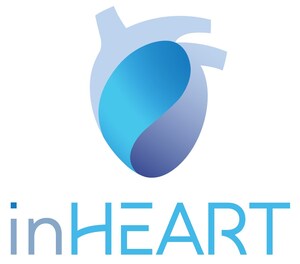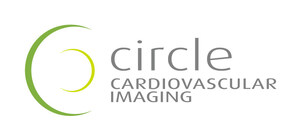A first-of-its-kind study comparing image-guided ventricular tachycardia (VT) ablation to conventional, catheter-based strategies to evaluate efficiency and efficacy of image-guided procedures in cardiac arrythmia patients.
CAMBRIDGE, Mass. and PESSAC, France, April 28, 2022 /PRNewswire/ -- inHEART Inc., a privately-held medical device company delivering the world's most sophisticated, AI-enabled, digitally-rendered 3D models of the heart, announced today that it has begun enrollment of the inEurHeart clinical study; a multicenter, prospective, blind randomized controlled trial (RCT) to compare the efficiency and efficacy of image-guided ventricular tachycardia (VT) ablations to conventional, catheter-based methods. The study aims to enroll 112 patients in 15 heart centers across four European countries over the next 12 months.
"The inEurHeart clinical trial is a critical step in the scientific evaluation of image-guided ablations and we are excited to be enrolling patients in this study," stated Prof. Thomas Deneke, Director of the Heart Center at RHÖN KLINKUM in Bad Neustadt, Germany. "The additional information provided by the inHEART solution has already been instrumental in determining treatment strategies for some of our most challenging VT cases and we look forward to the findings of this work to further inform the future of image-guided therapy."
The inHEART solution aims to address many of the challenges of conventional VT ablation with its proprietary segmentation algorithm that analyzes CT or MR images to create interactive 3D models of the heart with unprecedented anatomical details, including a precise description of the arrhythmogenic areas in the scar. This additional information allows physicians to optimize treatment strategies based on each patient's unique cardiac anatomy and supports detailed, pre-procedural planning and advanced intraprocedural guidance with integration into all major electroanatomic mapping (EAM) systems. This helps physicians develop individualized treatment strategies and supports procedural efficiencies, allowing for greater focus on the execution of the therapy during the procedure.
The inEurHeart RCT is a component of a larger innovation collaboration between five organizations in France and the Netherlands to advance the use of artificial intelligence (AI) tools in everyday clinical practice to make complex cardiac therapies accessible to more patients around the world. The inEurHeart project is funded by EIT Health (the European Institute of Innovation and Technology) and co-funded by the European Union. The project strives to exemplify how academic and industry relationships can lead to significant changes in clinical practice.
"We are excited to begin enrollment of the RCT as part of the broader inEurHeart project," stated Todor Jeliaskov, President and CEO of inHEART. "The inHEART solution is now commercially available in the US and EU and with data from this trial, we will build broad product adoption to bring the most advanced cardiac care to patients around the world."
Cardiovascular disease is a leading cause of global mortality, accounting for almost 17 million deaths annually, or 30% of all deaths worldwide. It is estimated that 40% - 50% of all cardiovascular deaths are sudden cardiac deaths (SCDs) and roughly 80% of SCDs are caused by ventricular arrythmias, including ventricular tachycardia and ventricular fibrillation.1 Treatments for VT include implantation of cardioverter defibrillators (ICD), anti-arrhythmic drug treatment, and catheter ablation, but these therapies are limited by incomplete efficacy, unfavorable side effects, and procedural risks.2 Success rates for conventional VT ablation remain low and variable due to the complexity of the arrhythmia and the inaccurate and incomplete identification of ablation targets.
Early clinical evaluations of the inHEART solution have shown a potential to reduce VT procedure times by 60% as compared to the conventional approach (from 5 hours to less than 2 hours). Shorter procedures are typically associated with superior safety and patient experience. Using inHEART's digital twin also means that there is no need to induce poorly tolerated ventricular arrhythmia, contributing to easier and simpler procedures. In addition, these evaluations have demonstrated the potential for image-guided ablations to improve procedure success rates by 15%, as compared to the conventional approach (from 60% to 75%).3
For more information, visit www.inheartmedical.com or visit us at HRS 2022 in San Francisco April 29 – May 1 at booth 243.
About inHEART
inHEART - a spin-off company of IHU LIRYC - is committed to delivering the world's most sophisticated, AI-enabled, digital twin of the heart to advance the care of patients living with cardiac disease. We believe all patients deserve access to world-class expertise that guides and optimizes treatment strategies to support improved clinical outcomes and return patients to full, healthy lives.
1 Mehra, R. J Electrocardiol. Nov-Dec 2007; 40 (6 Suppl): S118-22. doi: 10.1016/j.jelectrocard.2007.06.023
2 Spartalis, M. et al. World J Cardiol. 2018 Jul 26: 10(7):52-59. doi: 10.4330/wjc.v10.i7.52
3 Jais P, CT/MRI-guided ventricular tachycardia ablation, EHRA 2021
SOURCE inHEART

WANT YOUR COMPANY'S NEWS FEATURED ON PRNEWSWIRE.COM?
Newsrooms &
Influencers
Digital Media
Outlets
Journalists
Opted In






Share this article